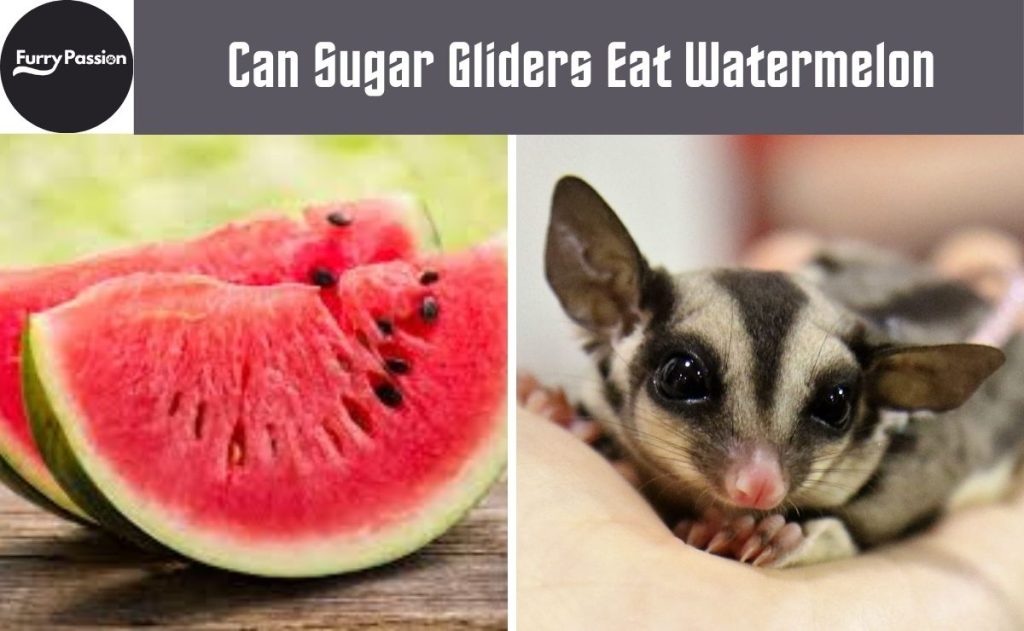No doubt, watermelon is an all-time favorite summer fruit. It’s so refreshing as well as has a lot of health benefits. We love watermelon so much, but can sugar gliders eat watermelon? Is it safe for sugar gliders to eat?
The answer is yes, sugar gliders can enjoy watermelon. However, it should be fed as a treat and only be given in moderation. Also, you should not feed seeds and rinds to avoid potential health issues. Later on, we have explained a comprehensive guide on this topic.
Can Sugar Gliders Eat Watermelon?

Sugar gliders are small marsupials that love surgery and fruity treats. Though they primarily eat a diet of nectar, sap, and insects in the wild, they can also enjoy a variety of fruits as part of their balanced diet in captivity.
Watermelon is a juicy and tasty fruit, and sugar gliders can enjoy this juicy treat without any worries. In fact, these little pets absolutely love it. Not only does it satisfy their sweet tooth, but watermelons also pack a nutritional punch.
Including watermelons in your pet’s daily diet is smart, but they should steer clear of the rind and seeds. Although sugar gliders have diverse tastes, their diminutive size poses a challenge to caregivers. A common pitfall is overfeeding; even the slightest toxic intake can harm their health.
Do Sugar Gliders Like Eating Watermelons?
Watermelons are among the top picks for sugar gliders. They have a sweet craving and the sweetness and juiciness of watermelon perfectly align with their taste preferences. Most gliders love to eat watermelons.
However, sugar gliders are somewhat selective eaters. So the likeliness of watermelon won’t be the same for all of them. There are a few gliders who may not like watermelon.
The best way to find out is to offer them melons a couple of times and observe their response. If they dive right in, you have your answer. If not, well, they might just be a bit picky when it comes to watermelons.
Can baby sugar gliders eat watermelon?
During the initial eight weeks of their lives, joeys exclusively rely on their mothers’ milk for nourishment. Once they reach the post-eight-week milestone, you can begin introducing small portions of watermelon to their diet.
You can share watermelon with your sugar baby, but maintain caution not to overfeed. Keep portions in check to ensure a balanced and healthy diet for your little one.
As baby sugar gliders grow up, they switch from only drinking their mom’s milk to trying out new foods like watermelon. This change is a big step in their development. But, it’s important to be careful during this time.
What Are The Benefits Of Watermelons for Sugar Gliders?
Sugar gliders can have many health benefits from watermelon. Beyond being a delightful treat, watermelons serve as a nutritional pack that provides essential vitamins and minerals.
First of all, hydration is important for these small pets, and watermelons excel in this department. It consists of over 90% water. So it helps them to stay hydrated.
If your sugar glider becomes dehydrated due to a warmer climate, then you can give it a piece of watermelon to get the necessary water content. This becomes particularly significant in regions with warm climates or indoor enclosures, where hydration is paramount.
Watermelon also provides necessary vitamins. Though sugar gliders can produce their own vitamin C, they rely on their food for other vital vitamins like A, B-complex, D, E, and K.
Watermelons contain these nutrients, along with thiamin, pantothenic acid, pyridoxine, folates, and niacin – all pivotal for their nutrition.
Moreover, the presence of antioxidants adds an extra layer of protection, potentially reducing the risk of cancer and heart disease for your sugar glider.
Not just a flavorful snack, watermelon proves to be an excellent source of fiber that offers healthy digestion for your pet. This dietary inclusion goes beyond mere enjoyment, offering a holistic approach to supporting the overall health and vitality of your sugar glider.
Precautions Before Feeding Watermelon
When it comes to feeding watermelons, you should remove the black and white seeds before presenting this juicy treat to your gliders. Though they are smart enough and they don’t consume the seeds. They only eat the juicy part.
Furthermore, watermelon seeds don’t have any harmful toxins that are found in substances like apple seeds. But you should always stay in the safe part to avoid the potential risk of ingestion and choking issues.
While sugar gliders can technically consume watermelon rind, it might not be the best idea for two compelling reasons. Firstly, the high fiber content in the rind surpasses their digestive capacity, potentially causing gastrointestinal issues.
Secondly, even for humans, watermelon rinds are tough to chew, and for your tiny companion, it could lead to an upset stomach. Make sure your sugar gliders don’t eat watermelon rinds, and keep their diet focused on the fleshier parts of this refreshing fruit.
How Often You Can Feed Watermelon To Sugar Glider?
A well-balanced diet is key to meeting your pet’s nutritional needs adequately. While watermelon adds a sweet touch, make sure to incorporate other foods to guarantee they get a wholesome array of nutrients.
You can include watermelon in your sugar glider’s daily diet but provide them with delectable slices. Unlike canned foods that may harbor chemicals, organic watermelon stands as a natural and safe option for your pet.
Typically, sugar gliders consume up to 20% of their body weight daily. Keep in mind that these little creatures, weigh around 5 ounces. So 2 to 3 teaspoons of watermelon per day will be enough for them. As sugar gliders are picky eaters, serve new fruits and food in small pieces.
Besides watermelon, sugar gliders can also enjoy a variety of other fruits including mango, apple, and banana. But remember that fruits should only make up a small portion of their overall diet. The majority of their nutrition comes from a balanced commercial diet specifically formulated for sugar gliders.
Is Watermelon Safe For Sugar Gliders?
Watermelon boasts a range of nutrients that can be beneficial for pets like sugar gliders. It is safe to eat for your sugar gliders but in small quantities. Excessive intake can cause health problems.
Watermelon contains natural sugars that contribute to its sweet taste. While these sugars add to the flavor, too much sugar intake can lead to health issues like obesity in sugar gliders.
This fruit is nutritious for humans but it lacks the proteins, calories, and fats essential for sugar gliders. Therefore, it should be treated as an occasional delight rather than a primary food source.
You can feed watermelon as a hydrating and vitamin-rich treat for sugar gliders. However, due to its high sugar content and the absence of essential nutrients, it should be introduced in moderation.
In other words, while it’s okay for your pet to eat some watermelon every day or even every other day, overeating at once can cause diarrhea and other digestion issues. If this happens, try giving your pet smaller pieces over time instead of a large amount.
Conclusion
Sugar gliders can enjoy watermelon as a treat; it should be given in moderation to prevent any potential health issues.
As always, consulting with a veterinarian is the best way to ensure that you are meeting your sugar gliders’ dietary needs and keeping them healthy and happy.
Related Posts
